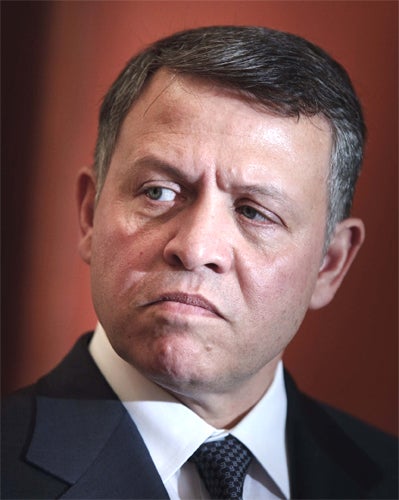King of Jordan accuses Israel of 'underhand' plot to thwart nuclear project

Jordan's King Abdullah II has accused Israel of making "underhand" efforts to prevent the Middle Eastern country from developing a peaceful nuclear energy programme.
In an interview with the Wall Street Journal, King Abdullah said Israel had sought to persuade countries such as France and South Korea not to sell Jordan the nuclear technology it needs to develop its own civilian nuclear power industry.
"There are countries, Israel in particular, that are more worried about us being economically independent than the issue of nuclear energy, and have been voicing their concerns," King Abdullah said. "There are many such reactors in the world and a lot more coming, so [the Israelis should] go mind their own business."
King Abdullah, a vital ally of Israel in a largely hostile Middle East, warned that Israeli meddling in its nuclear ambitions had helped plunge relations between the two countries to their lowest point since a peace agreement was signed in 1994.
Israel, universally thought to have developed its own nuclear weapons, has long voiced its fears of a nuclear arms race in the Middle East triggered by the threat of Iran's atomic ambitions. The United Nations and the West suspect Iran of pursuing nuclear weapons under the guise of a civilian energy programme.
Jordan discovered huge deposits of uranium ore in 2007, giving the kingdom a tantalising glimpse of what an energy future free of dependence on costly oil imports might look like. Under an ambitious new energy strategy, Jordan envisages that nuclear energy will meet 30 per cent of its energy needs by 2030.
Crucially, Amman has won backing for its nuclear ambitions from Washington, which is seeking to promote the civilian use of atomic energy. Jordan is currently working out a nuclear cooperation deal with the US that would see American companies bring technology and know-how to Jordan.
The deal has been thrown into jeopardy, however, because the US does not want Jordan to produce its own nuclear fuel, the newspaper reported.
The accord would not prevent Jordan from mining the uranium, but it would not be allowed to convert it to fuel.
Jordanian officials have argued that the kingdom, a signatory of the nuclear nonproliferation treaty, has the right to produce the reactor fuel that would help shore up the country's economy.
King Abdullah argued that Jordan's model to involve private companies in the project would allay international concerns, and set an example for other countries. Besides Iran, both Syria and Israel have tried to block external scrutiny of their nuclear capabilities.
"I believe nuclear energy in Jordan will be done in such a way where it is a public-private partnership so everyone can see exactly what's going on," King Abdullah said. "If we can be the model of transparency, it will push others."
A spokesman from the Israeli Prime Minister's office declined to comment on the Jordanian claims.
Join our commenting forum
Join thought-provoking conversations, follow other Independent readers and see their replies
Comments